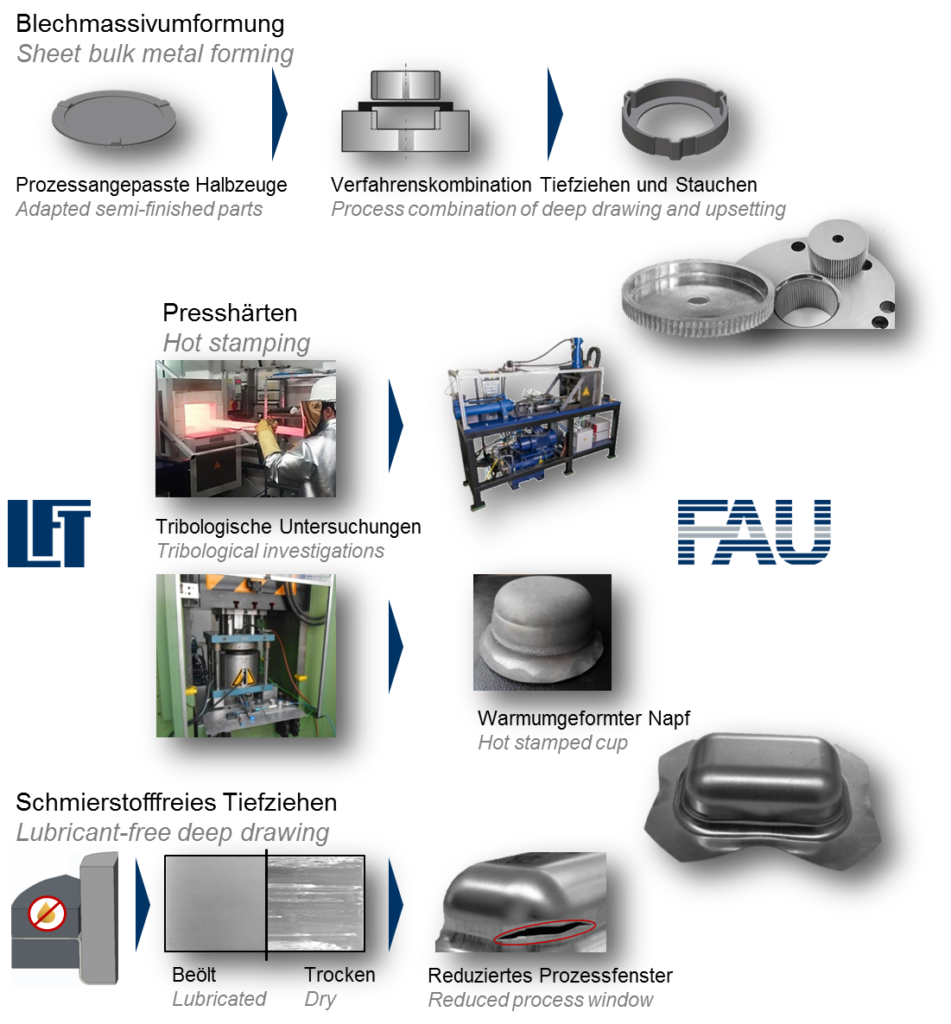
Numerical Simulation of Advanced Metal Forming Processes
Third Party Funds Group - Sub project
Start date : 01.01.2016
End date : 31.12.2020

Overall project details
Overall project
Multiscale Modelling, Simulation and Optimization for Energy, Advanced Materials and Manufacturing
Aug. 1, 2016 - July 31, 2020
Project details
Short description
Short description
For the project “Numerical Simulation of Advanced Metal Forming Processes”, the following scientific program has been defined:
• Numerical simulations and experimental investigations in the area of advanced metal forming will be conducted. It’s expected that advanced forming techniques will enable increased usage of lightweight materials like aluminum in the automotive industry.
• Simulations using the finite element method and experimental investigations on advanced metal forming processes, such as hydroforming aimed at improving room temperature formability of aluminum alloys will be carried out.
• Different combinations of sheet and tube hydroforming processes will be investigated.
• Warm forming processes such as stretch forming and deep drawing will be carried out on automotive-grade aluminum alloys and will be simulated to predict an accurate failure criterion.
• Studying the severe plastic deformation process (SPD) to produce ultra-fine grain materials with increased toughness. Processes such as accumulated roll bonding, cryo-rolling, and constrained groove pressing will be studied using both aluminum and steel sheets. Process modifications to suit the functional requirement of specific applications will be studied for the SPD processes. The microstructure and mechanical behavior of the processed sheets will be characterized.
• Finite element simulations will be performed for the above advanced forming processes using software such as LS-DYNA and Abaqus. The simulations are aimed at understanding the fundamental mechanics of the forming process and to optimize the process parameters.
• An automated optical strain measurement system will be used to measure the surface strains on the formed components to validate and correlate with the finite element simulations.
The following outcomes are expected:
• Establishing process modeling of hydroforming and determination of optimal process parameters.
• Establishing numerical prediction and development of failure criteria for warm forming of sheets.
• Achieving a formability improvement of ultra-fine grained automotive-grade aluminum alloys produced through Severe Plastic Deformation by process modification and modeling.
Scientific Abstract
Weight reduction while maintaining functional requirements is one of the major goals of engineering design and manufacturing so that materials, energy and cost are saved and environmental damage is reduced. Advanced grades of steel like ultra-low carbon interstitial free steels and ultra-high strength steels have been developed and are being used for critical automotive components. Lightweight materials like aluminium (Al) alloys offer great potential to reduce vehicle weight in auto industry by replacing the most commonly used materials, i.e. different grades of steel, because of their high strength to weight ratio, thermal properties, excellent corrosion resistance and easy machinability. Improvement in mechanical properties of aluminium alloys by alloying and heat treatment increased the application areas of these alloys in automotive and aerospace industries. In spite of a huge potential of Al alloys for the auto body and other applications for further weight reduction and fuel savings, the justification for replacement of steel with Al alloys is still questionable with conventional production processes because of high material cost and formability limitations. Therefore, advanced forming methods are needed in order to improve their formability. Hydro-forming, tailor welded blanks, warm forming and severe plastic deformation processes (such as cryorolling, accumulated roll bonding and constrained groove pressing) are some of the advanced forming techniques which are of great interest today.
For the project “Numerical Simulation of Advanced Metal Forming Processes” following scientific program has been defined.
• Numerical simulations and experimental investigations in the area of advanced metal forming will be conducted. It is expected that advanced forming techniques will enable increased usage of lightweight materials like aluminium in the automotive industry.
• Simulations using the finite element method and experimental investigations on advanced metal forming processes such as hydro-forming aimed at improving room temperature formability of aluminium alloys will be carried out.
• Different combinations of sheet and tube hydro-forming processes will be investigated.
• Warm forming processes such as stretch forming and deep drawing will be carried out on automotive grade aluminium alloys and will be simulated to predict an accurate failure criterion.
• Severe plastic deformation (SPD) process to produce ultra-fine grain materials with increased toughness will be studied. Processes such as accumulated roll bonding, cryo-rolling and constrained groove pressing will be studied using both aluminium and steel sheets. The process modification to suit the functional requirement of specific applications will be studied for the SPD processes. Microstructure and mechanical behavior of the processed sheets will be characterized.
• Finite element simulations will be performed for the above advanced forming processes using commercially available software such as LSDYNA and Abaqus. The simulations are aimed at understanding the fundamental mechanics of the forming process and to optimize the process parameters.
• Automated optical strain measurement system will be used to measure the surface strains on the formed components to validate and correlate with the finite element simulations.
Following scientific outcomes are expected:
• Process modelling of hydro-forming and determination of optimal process parameters.
• Numerical prediction and development of failure criteria for warm forming of sheets.
• Formability improvement of ultra-fine grained automotive grade aluminium alloys produced through Severe Plastic Deformation by process modification and modeling.